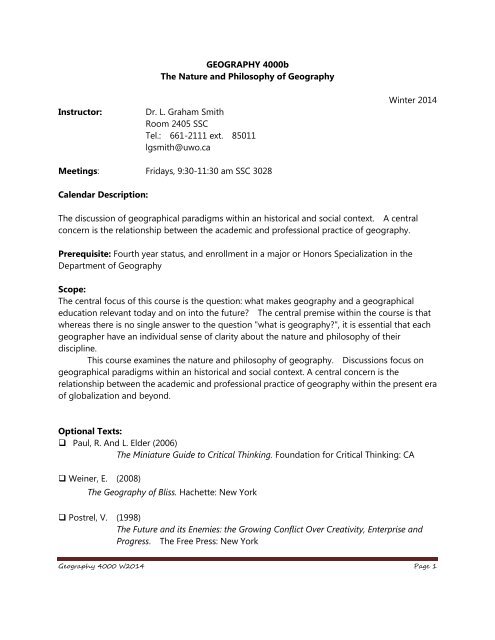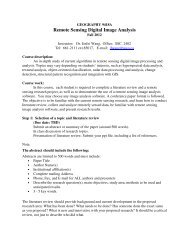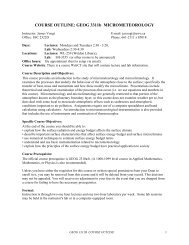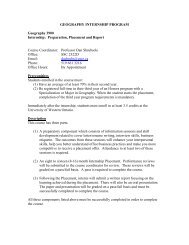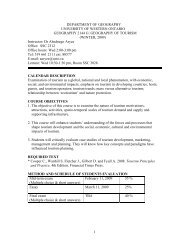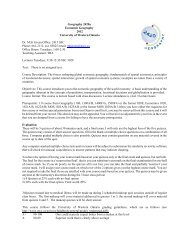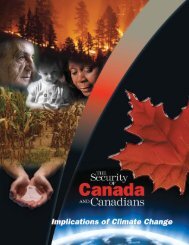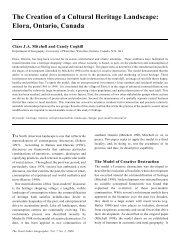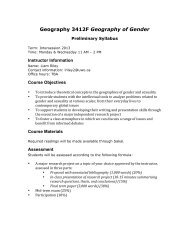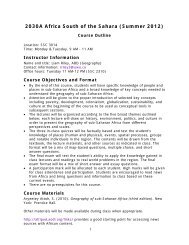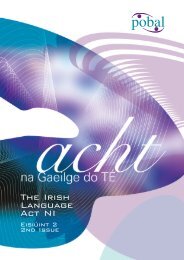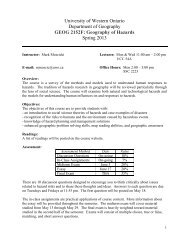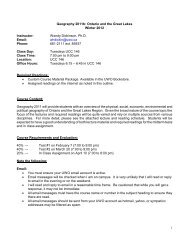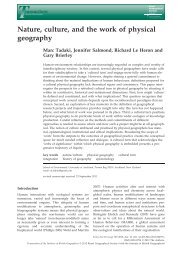The Nature and Philosophy of Geography - Geography, Department ...
The Nature and Philosophy of Geography - Geography, Department ...
The Nature and Philosophy of Geography - Geography, Department ...
Create successful ePaper yourself
Turn your PDF publications into a flip-book with our unique Google optimized e-Paper software.
GEOGRAPHY 4000b<br />
<strong>The</strong> <strong>Nature</strong> <strong>and</strong> <strong>Philosophy</strong> <strong>of</strong> <strong>Geography</strong><br />
Instructor:<br />
Dr. L. Graham Smith<br />
Room 2405 SSC<br />
Tel.: 661-2111 ext. 85011<br />
lgsmith@uwo.ca<br />
Winter 2014<br />
Meetings: Fridays, 9:30-11:30 am SSC 3028<br />
Calendar Description:<br />
<strong>The</strong> discussion <strong>of</strong> geographical paradigms within an historical <strong>and</strong> social context. A central<br />
concern is the relationship between the academic <strong>and</strong> pr<strong>of</strong>essional practice <strong>of</strong> geography.<br />
Prerequisite: Fourth year status, <strong>and</strong> enrollment in a major or Honors Specialization in the<br />
<strong>Department</strong> <strong>of</strong> <strong>Geography</strong><br />
Scope:<br />
<strong>The</strong> central focus <strong>of</strong> this course is the question: what makes geography <strong>and</strong> a geographical<br />
education relevant today <strong>and</strong> on into the future? <strong>The</strong> central premise within the course is that<br />
whereas there is no single answer to the question "what is geography?", it is essential that each<br />
geographer have an individual sense <strong>of</strong> clarity about the nature <strong>and</strong> philosophy <strong>of</strong> their<br />
discipline.<br />
This course examines the nature <strong>and</strong> philosophy <strong>of</strong> geography. Discussions focus on<br />
geographical paradigms within an historical <strong>and</strong> social context. A central concern is the<br />
relationship between the academic <strong>and</strong> pr<strong>of</strong>essional practice <strong>of</strong> geography within the present era<br />
<strong>of</strong> globalization <strong>and</strong> beyond.<br />
Optional Texts:<br />
Paul, R. And L. Elder (2006)<br />
<strong>The</strong> Miniature Guide to Critical Thinking. Foundation for Critical Thinking: CA<br />
Weiner, E. (2008)<br />
<strong>The</strong> <strong>Geography</strong> <strong>of</strong> Bliss. Hachette: New York<br />
Postrel, V. (1998)<br />
<strong>The</strong> Future <strong>and</strong> its Enemies: the Growing Conflict Over Creativity, Enterprise <strong>and</strong><br />
Progress. <strong>The</strong> Free Press: New York<br />
<strong>Geography</strong> 4000 W2014 Page 1
Topic Outline:<br />
Why geography? Introduction <strong>and</strong> overview<br />
<strong>Geography</strong> defined: what is your definition <strong>of</strong> geography?<br />
Mapping geography: seeing the discipline <strong>and</strong> your place in it<br />
Excellence in geographic research: how is it determined?<br />
<strong>Geography</strong>’s traditional traditions: geography yesterday <strong>and</strong> today<br />
Science, knowledge <strong>and</strong> wisdom: paradigm shifts, ideology, epistemology, methodology<br />
<strong>and</strong> philosophy<br />
Physics or l<strong>and</strong>scape? Process <strong>and</strong> form in physical geography<br />
Critical necessity or unnecessary criticism? the status <strong>of</strong> human geography<br />
Globalized sustainability or sustainable globalization? <strong>The</strong> status <strong>of</strong> environmental<br />
geography<br />
Self-reflection: geography as lifelong learning<br />
Structure <strong>and</strong> Evaluation:<br />
<strong>The</strong> educational paradigm adopted in the course is that <strong>of</strong> inquiry-based learning which uses<br />
both problem-based <strong>and</strong> active learning methods. To facilitate these learning styles, the course<br />
adopts a highly interactive structure with a large component <strong>of</strong> small-group interaction <strong>and</strong><br />
workshop exercises. Emphasis is placed upon the development <strong>of</strong> skills (e.g. oral <strong>and</strong> written<br />
presentations, awareness, problem-solving, dispute resolution, group interaction) as well as the<br />
specific content <strong>of</strong> the subject matter. <strong>The</strong> course structure is specifically intended to facilitate<br />
independent learning. Structured feedback is provided for each class session in response to two<br />
central issues:<br />
What did I learn today?<br />
What questions do I have?<br />
Grading in the course is based on four components:<br />
<strong>Geography</strong> 4000 W2014 Page 2
Defining geography, 20%:<br />
What is the meaning <strong>of</strong> geography to you? Answer this question providing:<br />
your definition <strong>of</strong> geography<br />
a map <strong>of</strong> the discipline <strong>and</strong> your location in it, <strong>and</strong><br />
a discussion <strong>of</strong> the leading edge <strong>of</strong> your field in 1000 words or less.<br />
Length: maximum <strong>of</strong> five pages typed<br />
Due: January 24, 2014<br />
Your network <strong>of</strong> geographic excellence, 20%:<br />
What criteria do you use to define the meaning <strong>of</strong> excellence in geographic research?<br />
Which single article/book/blog best illustrates excellence in geography to you? Why?<br />
Develop a referral network from your seminal work. What are the characteristics <strong>and</strong><br />
dominant traits <strong>of</strong> your network?<br />
Length: maximum <strong>of</strong> five pages typed<br />
Due: February 28, 2014<br />
Self-reflection: geography as lifelong learning, 20%:<br />
Using the collated feedback sheets from each <strong>of</strong> the classes you have attended, discuss<br />
what you have learnt about your chosen discipline. <strong>The</strong> feedback sheets must<br />
accompany the paper as an appendix.<br />
Length: maximum <strong>of</strong> five pages typed<br />
Due: April 8, 2014<br />
Final Exam, 40%:<br />
Held after the completion <strong>of</strong> the course, the final exam covers all materials introduced during<br />
the term.<br />
<strong>The</strong> exam structure focuses on creative thinking <strong>and</strong> critical awareness developed through<br />
the course.<br />
<strong>The</strong> exam is closed book. No aids are permitted.<br />
No electronic devices will be allowed during the examination.<br />
Provisionally scheduled April 11-30, 2014<br />
<strong>Geography</strong> 4000 W2014 Page 3
Caveats:<br />
<strong>The</strong> pr<strong>of</strong>essor reserves the right not to grade any material submitted after its due date<br />
without his prior approval.<br />
<strong>The</strong> course is specifically designed to provoke participants to question, assess <strong>and</strong><br />
formulate their thinking, beliefs, ideology <strong>and</strong>/or philosophy: a premium is placed on the<br />
development <strong>of</strong> thought rather than reliance upon pre-existing opinion. However, it is<br />
not a requirement <strong>of</strong> the course that students agree with or subscribe to the beliefs,<br />
ideology <strong>and</strong>/or philosophy <strong>of</strong> the pr<strong>of</strong>essor.<br />
A statement on Academic Offences<br />
Scholastic <strong>of</strong>fences are taken seriously <strong>and</strong> students are directed to read the appropriate policy,<br />
specifically, the definition <strong>of</strong> what constitutes a Scholastic Offence, at the following Web site:<br />
http://www.uwo.ca/univsec/h<strong>and</strong>book/appeals/schol<strong>of</strong>f.pdf Students in geography are expected<br />
to conduct themselves in a polite <strong>and</strong> civil manner. Students are reminded <strong>of</strong> the University Code<br />
<strong>of</strong> Conduct for Students: http://www.uwo.ca/univsec/board/code.pdf<br />
All required papers may be subject to submission for textual similarity review to the commercial<br />
plagiarism detection s<strong>of</strong>tware under license to the University for the detection <strong>of</strong> plagiarism. All<br />
papers submitted for such checking will be included as source documents in the reference<br />
database for the purpose <strong>of</strong> detecting plagiarism <strong>of</strong> papers subsequently submitted to the<br />
system. Use <strong>of</strong> the service is subject to the licensing agreement, currently between <strong>The</strong> University<br />
<strong>of</strong> Western Ontario <strong>and</strong> Turnitin.com (http://www.turnitin.com ).<br />
Support Services<br />
Registrarial Services: http://www3.registrar.uwo.ca/index.cfm<br />
Student Development Services: http://www.sdc.uwo.ca/<br />
<br />
For UWO Policy on Accommodation for Medical Illness <strong>and</strong> a downloadable SMC see:<br />
o http://www.uwo.ca/univsec/h<strong>and</strong>book/appeals/accommodation_medical.pdf<br />
o Downloadable Student Medical Certificate (SMC): https://studentservices.uwo.ca<br />
under the Medical Documentation heading<br />
Students seeking academic accommodation on medical grounds for any missed tests, exams,<br />
participation components <strong>and</strong>/or assignments worth 10% or more <strong>of</strong> their final grade must apply<br />
to the Academic Counseling <strong>of</strong>fice <strong>of</strong> their home Faculty <strong>and</strong> provide documentation. Academic<br />
accommodation cannot be granted by the instructor or department<br />
<strong>Geography</strong> 4000 W2014 Page 4


